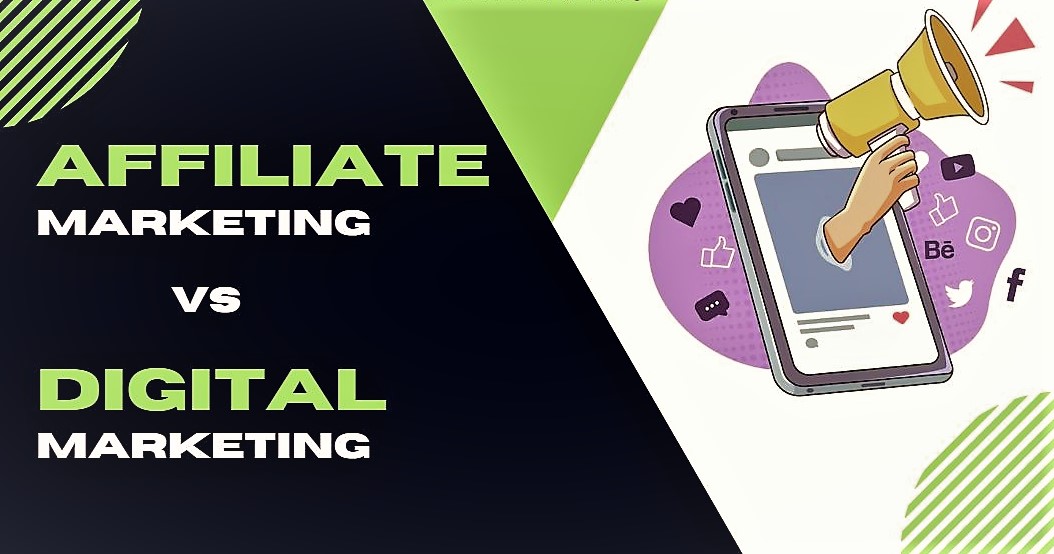Today we are talking about digital marketing vs affiliate marketing. Digital marketing encompasses an expansive spectrum of online advertising techniques. To succeed, it requires mastery in many areas including content marketing, SEO (search engine optimization), social media and email marketing.
Affiliate marketing entails promoting products on platforms like YouTube, Instagram, TikTok and blogs in order to earn commissions per sale transaction. It is an effective way of making passive income that can even be done as part-time work.

Introduction
Digital marketing has become an indispensable asset for businesses looking to reach and engage their target audiences. Digital marketing encompasses various strategies like SEO, social media marketing, PPC advertising and email marketing that aim to promote products or services and generate sales; also helping create relationships between brands, content, engagement and customer interactions.
Affiliate marketing, in contrast, involves a three-party partnership among an affiliate marketer, online retailers, and customers. When customers use an affiliate link that the online retailer has provided to them to make purchases, the affiliate marketer receives commissions as payment for promoting the retailer’s goods or services.
Both Digital Marketing vs Affiliate Marketing can be effective promotional tools to promote products and services to their audiences, however it is crucial that businesses understand both strategies’ individual strengths and weaknesses before selecting one that will best meet their business needs. Digital marketing is an all-encompassing approach that empowers businesses to manage the product marketing process themselves, but requires initial investments of both time and resources. Affiliate marketing, on the other hand, is more beginner-friendly and provides fast commissions when selling products. While it requires less initial time and resource investment than digital marketing strategies, its return may not be as high.
Mastering Art of Digital Marketing vs Affiliate Marketing
Today’s digital landscape requires staying abreast of the latest marketing trends. But with so many different terms being bandied about, it can be challenging to ascertain which strategies are suitable for your business. Affiliate marketing vs digital marketing may prove particularly confusing: digital marketing covers an array of strategies while affiliate marketing refers specifically to generating income by promoting products.
Digital and affiliate marketing both involve using online mediums to promote products, services and brands. Both strategies focus on engaging target audiences while drawing in new customers – both requiring knowledge of data analytics and marketing methodologies. While digital marketing aims at expanding brand recognition while building customer relationships more broadly than affiliate marketing does – affiliate marketing tends to concentrate more heavily on product promotion with an end goal of driving swift revenue growth through sales.
No matter the differences, both marketing strategies are beneficial to businesses of all sizes. The key to their effectiveness lies in finding one that aligns best with your business model; digital requires knowledge of SEO, social media strategy and email marketing while affiliate advertising aims to reach specific demographics while offering commission-based collaboration opportunities for higher earnings.
Digital Marketing vs Affiliate Marketing: What You Need to Know
Digital marketing employs various tactics to promote products and services online. This may include SEO, social media marketing, emailing campaigns and content promotion. Affiliate marketing is another form of digital promotion which involves promoting other people’s products for a commission on sales – this tactic works especially well when selling gadgets that elicit affiliate commissions.
digital marketing vs affiliate marketing both aim to attract online attention and turn it into action, though their approaches differ drastically: digital marketing tends to focus on building an extensive online presence while affiliate marketing seeks partnerships for mutual gain.
Digital marketers craft campaigns tailored to specific audiences in their own voice and utilize analytics to assess campaign performance, allowing them to tweak plans as necessary and maximize results. If necessary, digital marketers can also scale up or scale back efforts as required.
An affiliate marketer does not own their product and therefore cannot adjust prices or product lines accordingly, although their reach can still be limited as they only promote content across channels they control. But given its flexibility and ease of entry into affiliate marketing for beginners, affiliate marketing remains an effective marketing strategy choice for budding businesses. Understanding these differences when selecting your marketing strategy for business growth will help you decide between owning own products or using affiliates as partners in growing it further.
Conclusion
Digital marketing provides businesses with numerous strategies for reaching out to their audiences. Two popular approaches are digital and affiliate marketing; both leverage online mediums like search engines, social media, email and more to promote products and services – however each strategy differs slightly in key ways that may help you choose which option is most suited to your company.
Affiliate marketing entails promoting someone else’s product for a commission on sales. It is ideal for novice marketers as there is minimal startup costs; however, strong knowledge of SEO and social media may be required for success. In comparison, digital marketing requires more complex skillsets; tracking results may prove frustrating for beginners.
Related affiliate marketing occurs when marketers promote products or services related to their niche or area of expertise. While this strategy can generate traffic and build trust among audiences, it can also be risky if affiliates don’t personally experience or believe in what they promote. Engaged affiliate marketing offers an alternative which mitigates this risk by permitting affiliates to make claims regarding firsthand experiences instead.




